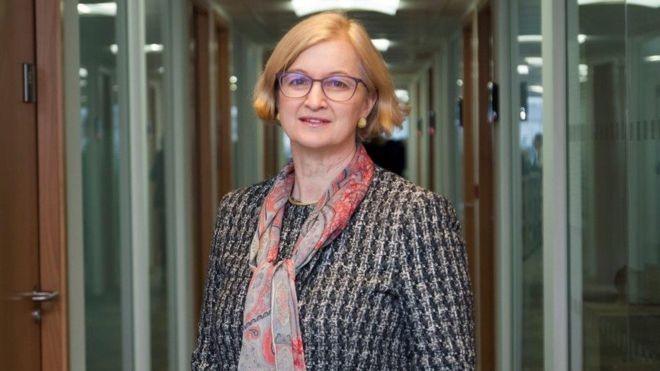Ofsted boss Amanda Spielman warns mentioning exams ups pressure
- Published
- comments

Primary schools can run tests without pupils even realising, said Ms Spielman
Merely asking pupils how they are feeling about their exams risks piling on the pressure, England's chief inspector of schools has warned.
As pupils began their SATs and GCSEs, Ofsted boss Amanda Spielman said even talking about them can raise anxiety.
Ideally primary schools should run the tests without pupils even realising, Ms Spielman said.
Her comments came ahead of the launch of a new Ofsted inspection framework which puts less weight on exam results.
"Good primary schools manage to run key stage tests often with children not even knowing that they're being tested," she said.
"Seven-year-olds [think], 'oh we did a maths booklet today, great'.
"I was in a primary school not long ago where I saw something that did concern me, where the head was going around clapping the Year 6s on the shoulder, saying: 'So are you feeling OK about the test, is everything going well for you?'
"And I thought actually maybe that is well-meaning, but maybe that's actually subliminally encouraging children to feel anxious."
Ms Spielman was speaking amid growing concerns that schools' focus on exam results is harming children's mental health.
"Clearly testing happens in every system throughout the world," said Ms Spielman.
"It only becomes a big deal for children if people make it so for them."
'Real learning'
From September, Ofsted says inspectors will spend less time looking at exam results and test data, and more time considering how education providers have achieved their results.
The watchdog says it wants to ensure that good grades are achieved through a "broad, rich curriculum and real learning" rather than "teaching to the test and exam cramming".
The new framework will:
crack down harder on bad classroom behaviour and bullying
introduce separate judgements for pupils' "behaviour and attitudes" and "personal development"
empower schools always to put the child first
discourage "off-rolling" where schools remove low-achieving pupils
Inspection reports will also be redesigned and shortened to give parents the key information they need.
The changes follow a three-month public consultation, which had more than 15,000 responses.
"Our goal is really simple, to be a force for improvement through our inspections," said Ms Spielman.
England's Education Secretary Damian Hinds called the new framework "a major step in supporting our shared drive to raise standards across the school system, so that every child can have access to a world-class education".
But the National Education Union said it represented a "woefully missed" opportunity.
The union's joint general secretary, Dr Mary Bousted, said data would remain at the heart of the inspection process, with schools judged against national attainment scores which might bear little or no relationship to the local population.
"We believe schools and colleges will still not be evaluated accurately or be provided with worthwhile feedback," said Dr Bousted.
Nick Brook, deputy general secretary of the National Association of Head Teachers, said he feared the framework would "prove to be unworkable in practice".
"Inspectors are being asked to do too much with too little resource and with too great a degree of subjectivity," said Mr Brook.
- Published16 January 2019

- Published11 October 2018

- Published18 September 2018
